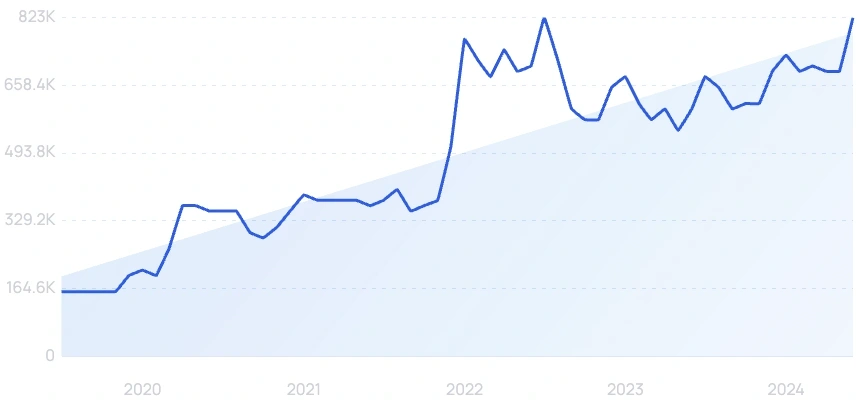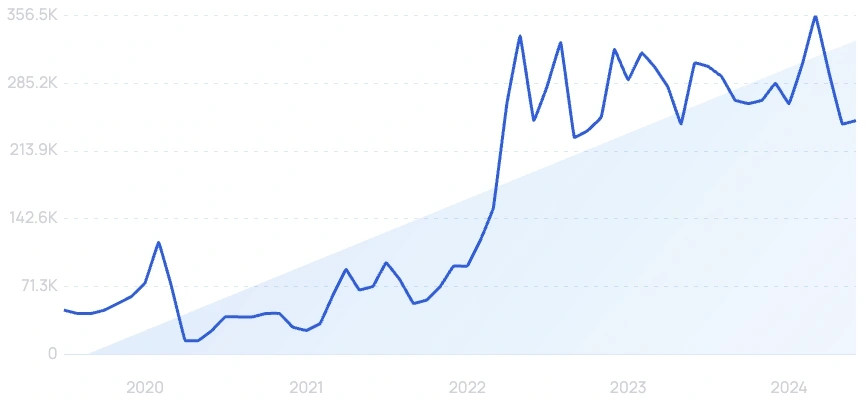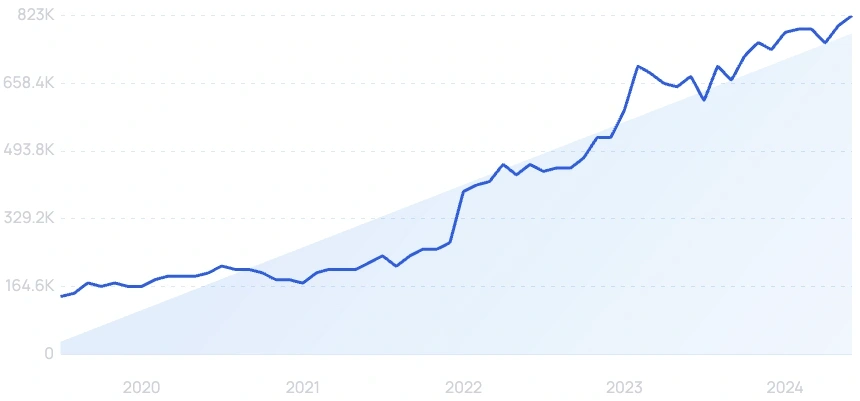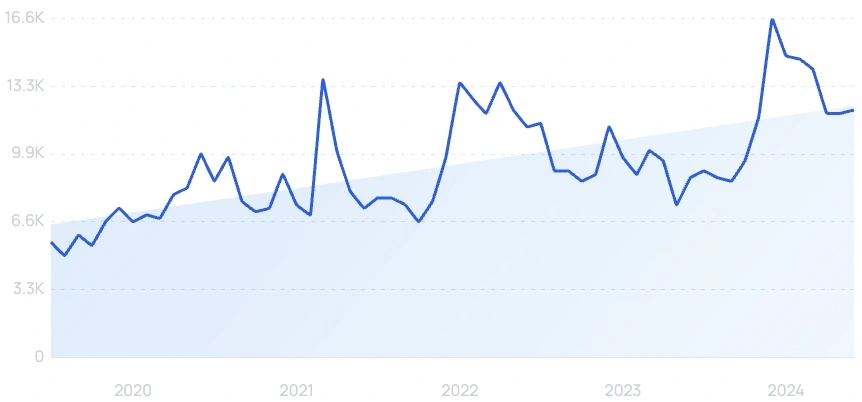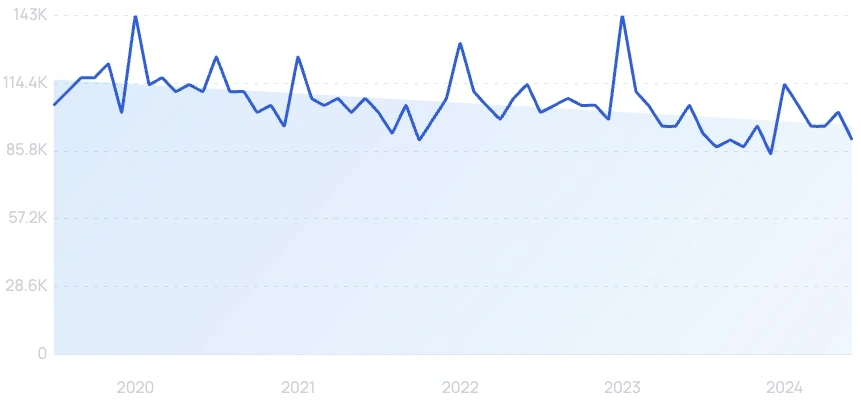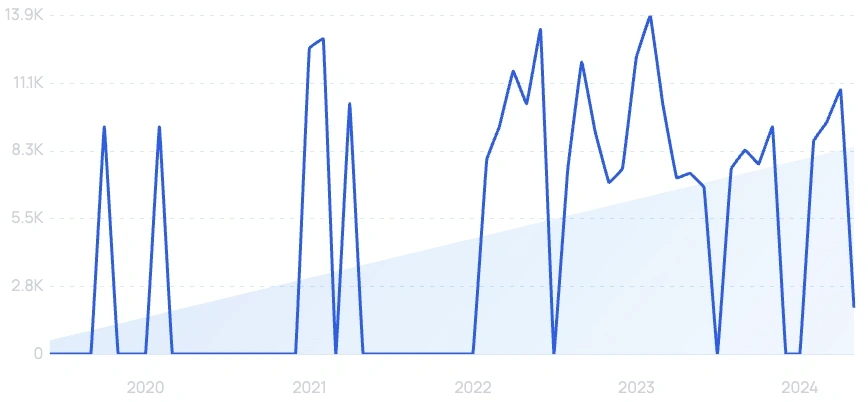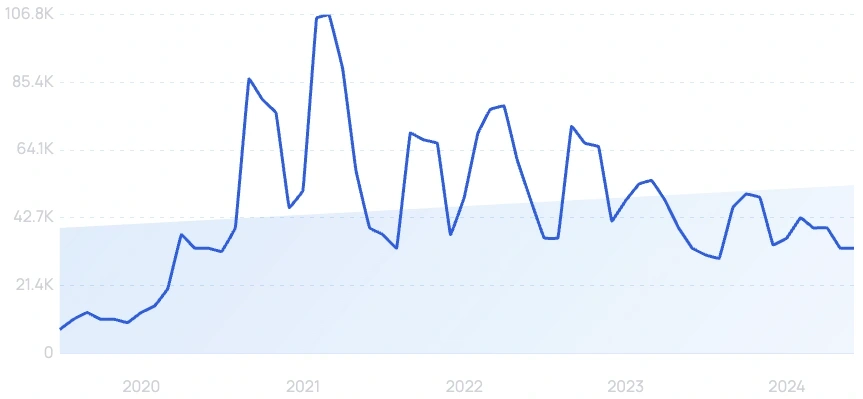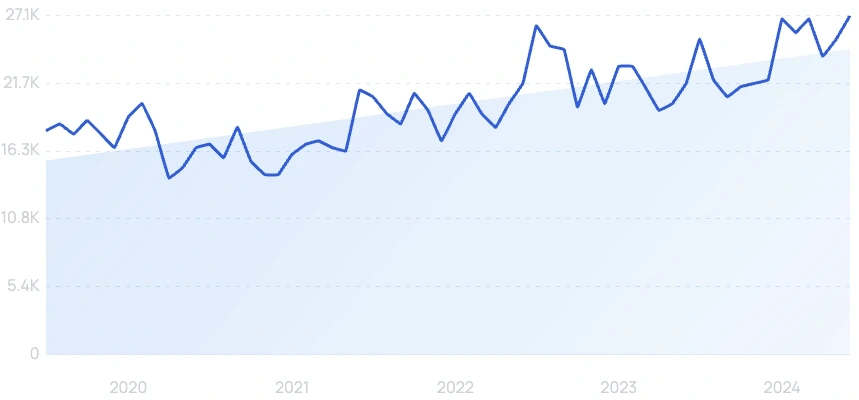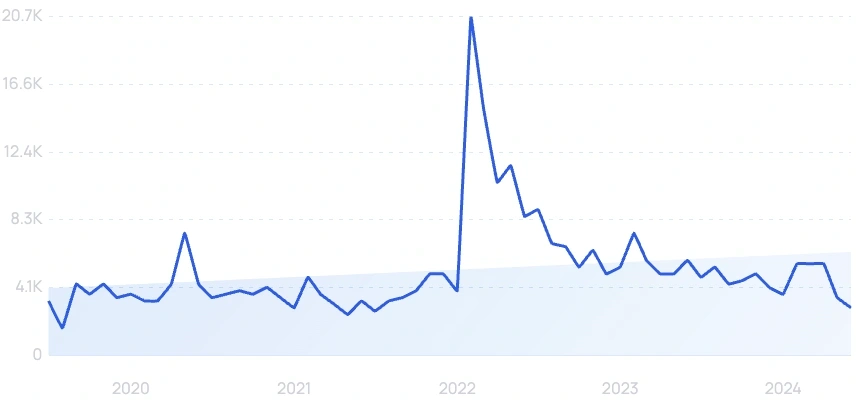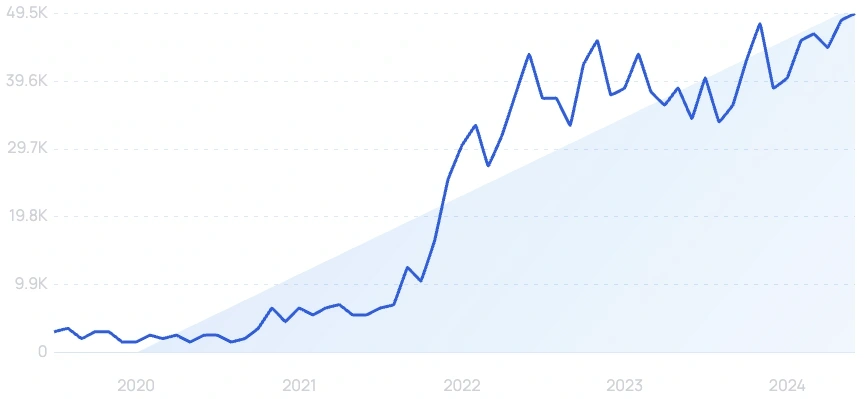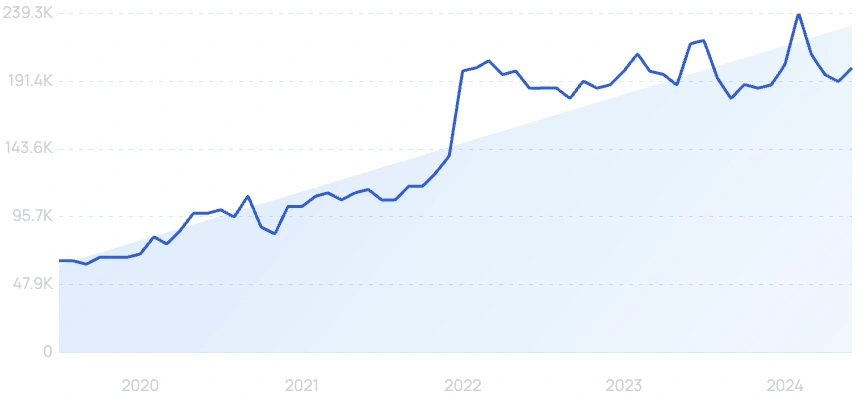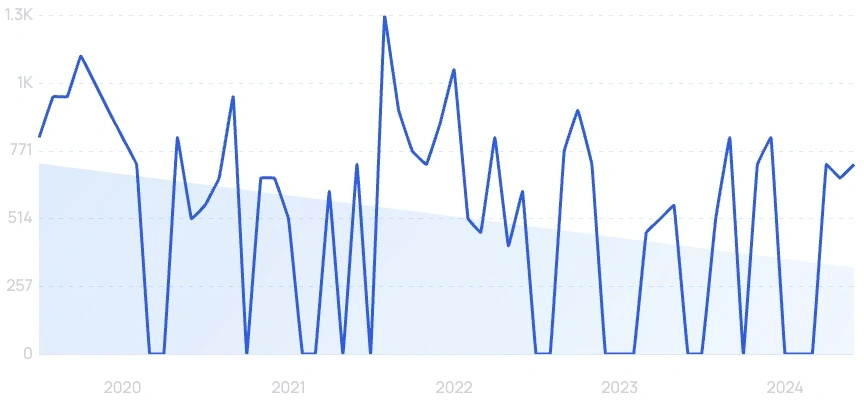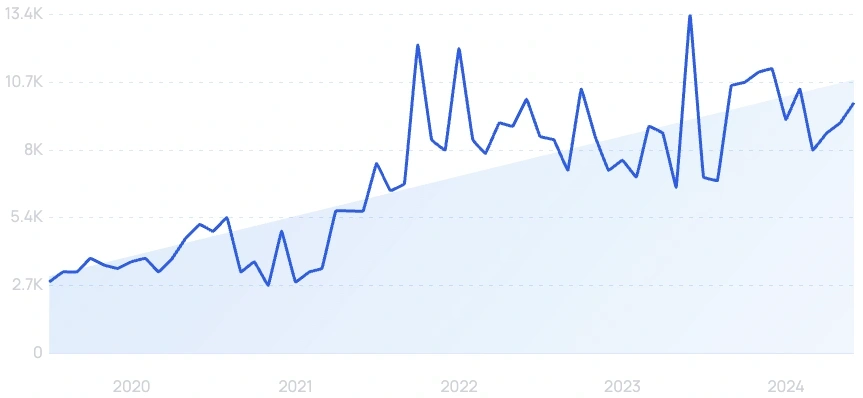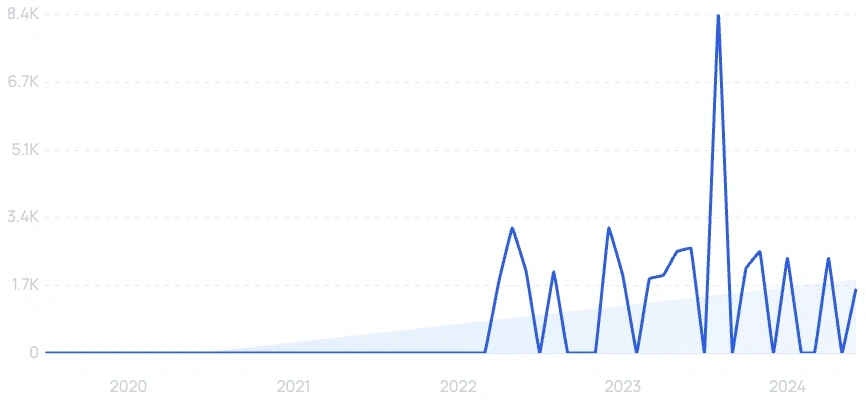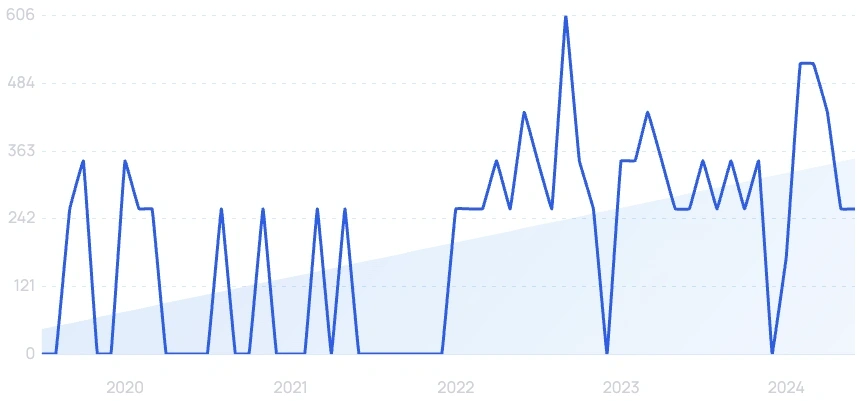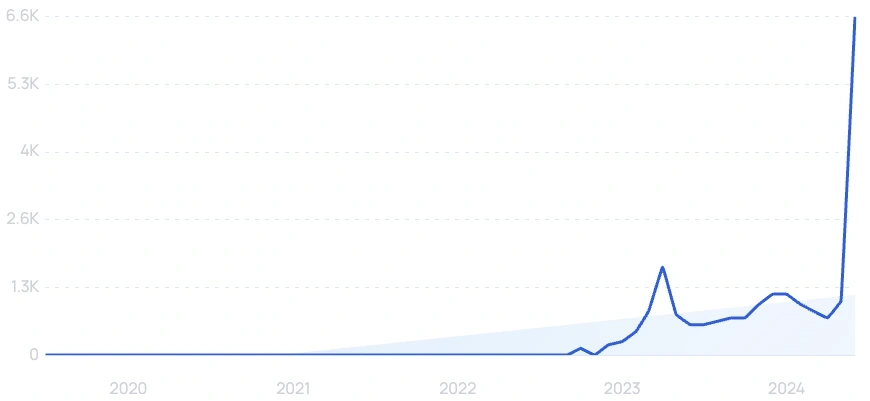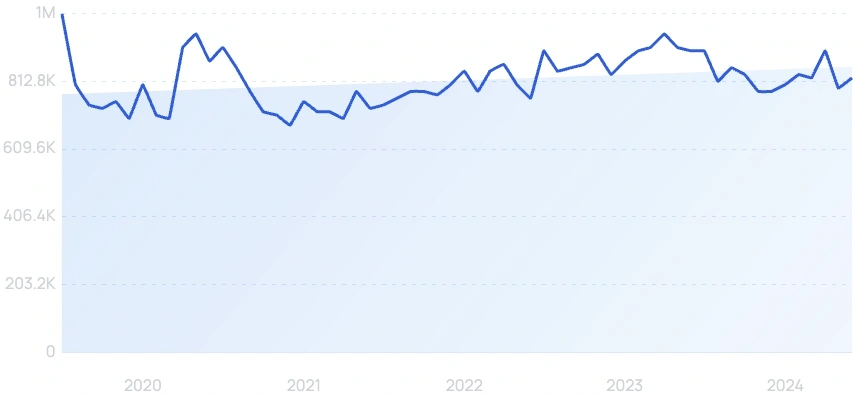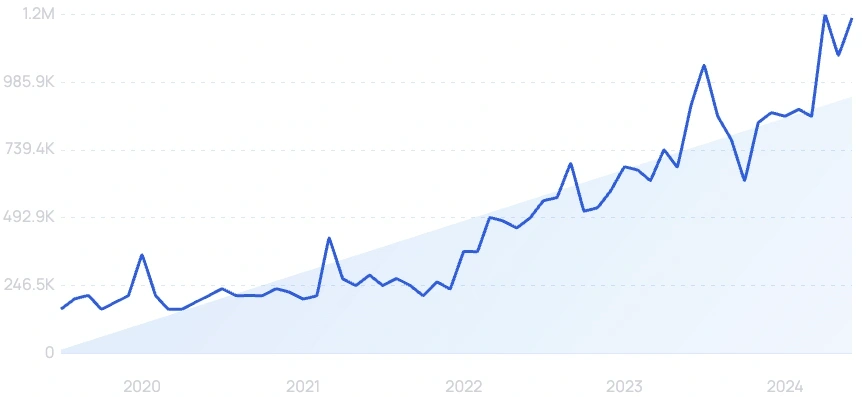Get Advanced Insights on Any Topic
Discover Trends 12+ Months Before Everyone Else
How We Find Trends Before They Take Off
Exploding Topics’ advanced algorithm monitors millions of unstructured data points to spot trends early on.

Keyword Research
Performance Tracking
Competitor Intelligence
Fix Your Site’s SEO Issues in 30 Seconds
Find technical issues blocking search visibility. Get prioritized, actionable fixes in seconds.
Powered by data from
19 Explosive VR Companies & Startups In 2024
You may also like:
- 45 Soaring Video Games Companies & Startups
- 13 Top Technology Trends
- 25 Trending Machine Learning Companies & Startups
Virtual reality (VR) has been an industry known largely for lofty promises and hype... but a little tangible transformation in our daily lives.
That said, the VR space is still going strong. Especially for niche use cases.
From construction to content creation to medicine and beyond, a new crop of VR companies are using VR to change the way we shop, entertain ourselves, and conduct business.
Read on for our list of the 19 promising VR startups that are aiming to fulfill virtual reality’s long-awaited promise.
1. VRChat
5-year search growth: 425%
Search growth status: Exploding
Year founded: 2014
Location: San Francisco, CA
Funding: $95.2M (Series D)
What they do: VRChat is a social platform for virtual reality users to interact and socialize with each other. Their platform offers users a variety of customizable avatars and environments, allowing them to create unique virtual experiences.
With VRChat, users can connect with others from around the world and immerse themselves in a variety of virtual worlds and games.
2. Sandbox VR
5-year search growth: 431%
Search growth status: Exploding
Year founded: 2016
Location: San Francisco, CA
Funding: $63M (Series B)
What they do: Sandbox VR is a VR company that provides a location-based virtual reality experience, where players can enter immersive virtual worlds and play games with their friends. Their platform offers a variety of customizable avatars and game scenarios, allowing players to fully immerse themselves in a virtual reality experience.
With Sandbox VR, players can enjoy a social and interactive VR experience, blurring the line between physical and virtual reality.
3. Sketchfab
5-year search growth: 488%
Search growth status: Exploding
Year founded: 2012
Location: New York, New York
Funding: $12.1M (Series Unknown)
What they do: Sketchfab is an online platform where users can publish, share, find, buy, and sell 3D, VR, and AR assets. The platform uses WebGL and WebXR technologies to support these models in web browsers without third-party plugins. Today, the company supports more than 15 million users and 6 million 3D models.
4. Vive
5-year search growth: 115%
Search growth status: Regular
Year founded: 2015
Location: Taoyuan City, Taiwan
Funding: Undisclosed
What they do: Vive is a tech company specializing in virtual reality (VR), augmented reality (AR), and mixed reality (MR) experiences. Through their VR headsets, glasses, and accessories, the startup offers customers a full-body VR experience. Most notably, the startup has gained popularity because of the Vive Tracker. This handheld VR accessory allows users to track movement and bring real-world objects into the virtual universe with pinpoint accuracy.
5. OpenSpace
5-year search growth: -15%
Search growth status: Peaked
Year founded: 2017
Location: San Francisco, CA
Funding: $200.4M (Series D)
What they do: OpenSpace is a VR platform for construction and real estate professionals to collaborate and track progress on building projects. Their platform enables users to capture and track 360-degree imagery of construction sites in real-time, allowing for remote collaboration, documentation, and monitoring.
With OpenSpace, users can improve communication, reduce errors, and increase efficiency in the construction and real estate industries.
6. Dispelix
5-year search growth: 900%
Search growth status: Peaked
Year founded: 2011
Location: Espoo, Finland
Funding: $56.1M (Series B)
What they do: Dispelix is a VR startup that develops and manufactures ultra-thin, waveguide displays for use in augmented reality (AR) devices. Their technology enables high-quality, low-power consumption displays that can be integrated into eyewear and other form factors, providing users with immersive AR experiences.
Dispelix's advanced display technology allows customers to create new AR applications and devices with improved performance and usability.
7. Labster
5-year search growth: 343%
Search growth status: Peaked
Year founded: 2011
Location: Copenhagen, Denmark
Funding: $150.5M (Series C)
What they do: Labster is a VR platform for immersive science education. Their platform offers a variety of virtual science lab simulations, allowing students to conduct experiments and learn science concepts in a safe, engaging, and interactive environment.
Labster grants students access to high-quality science education from anywhere, and educators can offer hands-on lab experience without the need for physical lab facilities.
8. Breakroom
5-year search growth: 52%
Search growth status: Exploding
Year founded: 2014
Location: Reykjavik, Iceland
Funding: $510K (Grant)
What they do: Breakroom aims to solve the problems of remote workplace design with their innovative VR technology. By turning compatible VR headsets into multi monitor systems, users can experience the virtual working world that more simulates the physical office.
9. The Virtual Reality Company
5-year search growth: -12%
Search growth status: Peaked
Year founded: 2014
Location: Los Angeles, CA
Funding: $25.1M (Series A)
What they do: The VR Company is another startup focusing on the content side of the space.
The Jurassic World VR Experience (based on Jurassic Park) is probably their most well-known example, featuring a realistic combination of physical movement and leading VR technology.
10. Polycam
5-year search growth: 1,567%
Search growth status: Exploding
Year founded: 2021
Location: San Francisco, CA
Funding: $22.1M (Series A)
What they do: Polycam is a 3D scanning app available for iOS, web, and Android devices. The app can create 3D models of real spaces or virtual environments for immersive VR experiences. It uses a LiDAR sensor to scan open space and capture 360 photos. In February 2024, Polycam raised $18 million in Series A funding to " democratize 3D creation."
11. CGTrader
5-year search growth: 211%
Search growth status: Exploding
Year founded: 2011
Location: Vilnius, Lithuania
Funding: $12.1M (Series B)
What they do: CGTrader is a 3D model marketplace for virtual reality (VR), augmented reality (AR), and computer graphics (CG) projects. Designers can upload their work for sale, and buyers can browse available models, communicate directly with model authors, bid on prices, and even request custom models through the platform. Currently, CGTrader has 8.9 million 3D designers and 100+ Fortune 500 clients using the platform.
12. WEVR
5-year search growth: -12%
Search growth status: Peaked
Year founded: 2010
Location: Venice, CA
Funding: $38.8M (Series B)
What they do: WEVR is aiming to be the premier VR content creation studio. Unlike other companies on our list, which focus more on VR technology, WEVR is centered around the stories being told inside of a user’s headset.
With creators like Jon Favreau on board, WEVR has been able to attract a large amount of funding as they look to scale.
13. Varjo
5-year search growth: 252%
Search growth status: Exploding
Year founded: 2016
Location: Helsinki, Finland
Funding: $165.8M (Series Unknown)
What they do: Varjo develops high-resolution VR, AR, and mixed reality (MR) headsets. Their primary product line, the Varjo XR-4 Series, is known for high resolution, wide field of view, and advanced features such as gaze-driven autofocus cameras and integrated LiDAR sensors. Some of Varjo's customers include Boeing and Aston Martin.
14. Virtualitics
5-year search growth: 1,800%
Search growth status: Peaked
Year founded: 2015
Location: Pasadena, CA
Funding: $66.6M (Series C)
What they do: Virtualitics combines data visualization and data analysis with the power of virtual reality. Instead of users having to draw insights from typical Excel spreadsheets or tables, Virtualitics allows data to be manipulated in a virtual space.
Over 11 years of research by some of the brightest minds from CalTech and NASA, along with a team of data crunchers, has turned Virtualitics into an extremely attractive VR startup for many investors.
15. Merge Labs
5-year search growth: 200%
Search growth status: Regular
Year founded: 2014
Location: San Antonio, TX
Funding: $10.1M (Series Unknown)
What they do: Merge is an educational VR company, creating lifelike digital learning experiences that teach students using a traditional school curriculum. But instead of just reading about a Monarch Butterfly, Merge allows students to hold 3D digital objects of the insect.
16. Luma Labs
5-year search growth: 99x+
Search growth status: Exploding
Year founded: 2021
Location: Pao Alto, California
Funding: $67.3M (Series B)
What they do: Luma is a generative AI company that recently created the Luma Dream Machine. This AI model can create realistic 3D videos from text prompts or images. The company raised $43 million in Series B funding in January 2024 to continue advancing its AI-powered 3D models.
17. Obsess
5-year search growth: -19%
Search growth status: Regular
Year founded: 2017
Location: New York, NY
Funding: $13.9M (Non-Equity Assistance)
What they do: Obsess is targeting retail as the next great frontier of VR. Using Obsess’s technology, retailers ranging from Coach to AT&T to Anheuser Busch are creating virtual experiences and activities for their customers.
The core product is a 360 virtual experience customized to act as digital stores, showrooms (for clothing brands), or even a full retail store experience.
18. Insta360
5-year search growth: 662%
Search growth status: Exploding
Year founded: 2014
Location: Shenzhen, China
Funding: $59M (Series E)
What they do: Insta360 is a VR and 360 camera manufacturing company. The startup's primary VR cameras include the Titan and Pro 2, which capture 8k or 11k 3D video with FlowState stabilization technology. The Chinese camera company surpassed $2 billion in revenue at a 50% growth rate last year.
19. Relax VR
5-year search growth: -20%
Search growth status: Peaked
Year founded: 2016
Location: San Francisco, CA
Funding: Undisclosed (Convertible Note)
What they do: Relax VR combines meditation with an immersive virtual reality experience to help clients reach a calm and relaxed state.
Instead of staffing a full spa, Relax aims to let their headset do much of the rejuvenation work that a human would normally be required for. Tranquil landscapes or guided meditations allow the user to have a complete experience of relaxation and engage all of their senses simultaneously.
Conclusion
Virtual Reality has the potential to transform dozens of industries, and even the way we live our daily lives.
From medicine to real estate to entertainment, virtual reality is just getting started. Even though it may never become a mainstream tech, the companies here prove that the industry has the potential to thrive in many industries and niche use cases.
And the VR startups on this list represent some of the best attempts to create value in the space.
Stop Guessing, Start Growing 🚀
Use real-time topic data to create content that resonates and brings results.
Exploding Topics is owned by Semrush. Our mission is to provide accurate data and expert insights on emerging trends. Unless otherwise noted, this page’s content was written by either an employee or a paid contractor of Semrush Inc.
Share
Newsletter Signup
By clicking “Subscribe” you agree to Semrush Privacy Policy and consent to Semrush using your contact data for newsletter purposes
Written By


Josh is the Co-Founder and CTO of Exploding Topics. Josh has led Exploding Topics product development from the first line of co... Read more




